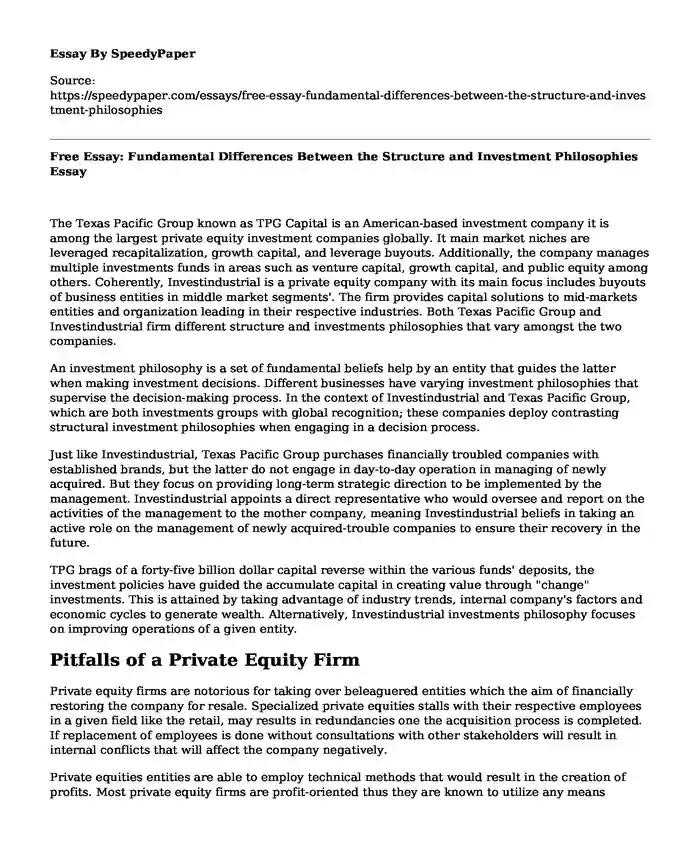
| Type of paper: | Case study |
| Categories: | Business strategy |
| Pages: | 3 |
| Wordcount: | 754 words |
The Texas Pacific Group known as TPG Capital is an American-based investment company it is among the largest private equity investment companies globally. It main market niches are leveraged recapitalization, growth capital, and leverage buyouts. Additionally, the company manages multiple investments funds in areas such as venture capital, growth capital, and public equity among others. Coherently, Investindustrial is a private equity company with its main focus includes buyouts of business entities in middle market segments'. The firm provides capital solutions to mid-markets entities and organization leading in their respective industries. Both Texas Pacific Group and Investindustrial firm different structure and investments philosophies that vary amongst the two companies.
An investment philosophy is a set of fundamental beliefs help by an entity that guides the latter when making investment decisions. Different businesses have varying investment philosophies that supervise the decision-making process. In the context of Investindustrial and Texas Pacific Group, which are both investments groups with global recognition; these companies deploy contrasting structural investment philosophies when engaging in a decision process.
Just like Investindustrial, Texas Pacific Group purchases financially troubled companies with established brands, but the latter do not engage in day-to-day operation in managing of newly acquired. But they focus on providing long-term strategic direction to be implemented by the management. Investindustrial appoints a direct representative who would oversee and report on the activities of the management to the mother company, meaning Investindustrial beliefs in taking an active role on the management of newly acquired-trouble companies to ensure their recovery in the future.
TPG brags of a forty-five billion dollar capital reverse within the various funds' deposits, the investment policies have guided the accumulate capital in creating value through "change" investments. This is attained by taking advantage of industry trends, internal company's factors and economic cycles to generate wealth. Alternatively, Investindustrial investments philosophy focuses on improving operations of a given entity.
Pitfalls of a Private Equity Firm
Private equity firms are notorious for taking over beleaguered entities which the aim of financially restoring the company for resale. Specialized private equities stalls with their respective employees in a given field like the retail, may results in redundancies one the acquisition process is completed. If replacement of employees is done without consultations with other stakeholders will result in internal conflicts that will affect the company negatively.
Private equities entities are able to employ technical methods that would result in the creation of profits. Most private equity firms are profit-oriented thus they are known to utilize any means necessary to create and generate profits from an acquired company. This can be detrimental to a publically traded company if the latter decides to replace the existing talents with the aim of hiring new manpower to generate profits. Such a move may be cause rift between the shareholders and the "new" management.
Private equity firms provide financial muscles to a publicly traded company when acquired as private entities. When a public company is experiencing financial difficulties that can result in solvency, PE firms can acquire shares or equity from the public company in exchange for financial aid and convert the latter in private In today's world it assumed that private equity firms undertake more buyouts of publicly traded companies compared to private companies. Such finical assistance has enabled most public companies to retain their footing in their respective industries cutesy of the financial support from PE firms. Hence private equity firm increases their market portfolio which in turn increases their revenues in the long run.
When private equity firms acquired public companies, they share volatility of risks associated with the investment, which is usually illiquid. Thus the probability of attaining negative results is minimal since the shareholders are also actively involved through their management staff to ensure the success of the entity. Consequently, PE firms acquiring publicly traded companies have a high possibility of recouping their initial investments.
Share tender offer in 2008
The internal rate of return is considered to be the interest rate at which the current present values of the total cash flows, both the negative and positive from an investment or a given project. It is typically used to determine the "attractiveness" of an investment or projects, if the IRR of projects supersede a company's rate of returns then the investment if desirable. Conversely, if the IRR falls below the anticipated rate of return, the project should be rejected.
EM (Equity Multiple) sometimes referred to as the expected money multiple is the summation of total net profit and maximum equity invested divided by maximum equity invested.
Cite this page
Free Essay: Fundamental Differences Between the Structure and Investment Philosophies. (2022, May 13). Retrieved from https://speedypaper.com/essays/free-essay-fundamental-differences-between-the-structure-and-investment-philosophies
Request Removal
If you are the original author of this essay and no longer wish to have it published on the SpeedyPaper website, please click below to request its removal:
- An Introduction to Religious Tourism - Free Essay
- Healthcare Reform Paper Example
- Folklore Analysis - Free Essay for Everyone
- Essay Example: Cross-Cultural Marriages
- Essay Sample on Coralville Lake and Devonian Fossil Gorge
- Essay Sample on Knowledge Management in UAE Organizations
- Free Essay - Popular Cultural Representation of the Human Body
Popular categories




